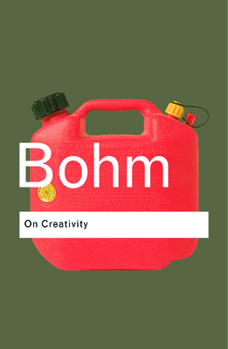On Creativity
Select Format
Select Condition 
Book Overview
Creativity is fundamental to human experience. In On Creativity David Bohm, the world-renowned scientist, investigates the phenomenon from all sides: not only the creativity of invention and of imagination but also that of perception and of discovery. This is a remarkable and life-affirming book by one of the most far-sighted thinkers of modern times.
Format:Paperback
Language:English
ISBN:0415336406
ISBN13:9780415336406
Release Date:September 2004
Publisher:Routledge
Length:192 Pages
Weight:0.44 lbs.
Dimensions:0.6" x 5.2" x 7.8"
Customer Reviews
2 ratings
Science and Art
Published by Thriftbooks.com User , 20 years ago
Consisting of four essays and an interview with Louwrien Wijers, On Creativity provides a clear window into the ruminations of physicist David Bohm. Author of a textbook on quantum mechanics, Bohm is best known for his speculations on "the implicate order," a world view which draws on quantum mechanics in an attempt to go behind colleague Niels Bohr's "Copenhagen Interpretation"-to wit, that the mathematics of quantum theory, which lead to paradoxes in the macroscopic realm, should not be construed as anything more than mathematical treatments that work. This view, or rather non-view, was not acceptable to Einstein. The basic solution of Bohm is to suggest that our entire three-dimensional reality, which shows evidence of nonlocality-the instantaneous measurable correlation of attributes of distant particles-is a projection of a deeper "enfolded" realm. These essays, however, with titles such as "On creativity," "On the relationships of science and art," "The range of imagination," and "The art of perceiving movement" are not overly recondite, abstruse, or abstract-let alone mathematical. In On Creativity, for example, Bohr analyzes what makes not just a great, but a truly original scientist, such as Newton and Einstein (with whom Bohm corresponded). Perhaps surprisingly, he includes Helen Keller and her teacher Anne Sullivan in their company. The reason has to do with Bohm's emphasis on an open-minded attitude, free of worldly obsessions such as career advancement or "kicks," that allows the truly creative mind to bust through societal blinders and see the world as a whole in a new way. In the case of Sullivan she exposed Keller, deaf and blind from birth, to water in a variety of settings, writing the word on her hand. At a given point, Keller, who was animalistic before, put the different stimuli together, seeing their underlying unity. This is the kind of unity that Bohr argues Newton discovered in his realization that planets, like apples, fall-only much more slowly-a view that dispensed with the prevailing notions of the Greeks, who distinguished between the perfection of the celestial, and the imperfection of the earthly realm. Einstein went further, showing that seemingly equidistant and simultaneous times and places really depended upon the relationship of observers to observed. What is wonderful about Bohm is that he is deeply immersed in and respectful of, art and philosophy and religion. A close friend of Krishnamurti, he relates the work of Hegelian philosophy and Coleridgian poetics to scientific inquiry; he says he personally was inspired by artists. For example, in the essay, "The Range of Imagination," he attempts to link art to science by starting with Owen Barfield's analysis of Coleridge's distinction between two kinds of imagination-primary imagination and fancy. Although they are linked-mutually implicated is as everything else in Bohm's implicate universe-the primary imagination is much more than just putting things
He was a remarkable man.
Published by Thriftbooks.com User , 23 years ago
Once again David Bohm, one of the most original of thinkers, has demonstrated his ability to make original and fascinating discoveries in regard to, let us say, life in general. This is a combination of physics, biology, philosophy etc etc or as it used to be called natural philosophy. Bohm was one of this century's last remaining natural philospohers in a time of specialisation, in some ways akin to Robert Rosen, Darcy Thomson or Einstein all of whom were willing to expand their frontiers beyond their areas of specialisation. What singles Bohm out is his deep investigation of all aspects of thought especially the study of thought itself, its origin and dissolution and is human life possible without it, in other words is thought all there is or does being human mean a great deal more and other ?In this short text Bohm looks at creativity, what it is, what it means in human life, how it works and various other aspects. Bohm, like in his other works, shys away from any form of solid definition, this is done on purpose, rather than because of a lack of understanding, Bohm insists that any form of thought, concept, idea which becomes crystalised as the "whole truth and nothing but the truth" interferes with the natural flow of reality which is ever changing and never static, this includes ideas as well which are insights about this flow (expanded on earlier in eg "Wholeness and the Implicate Order"). In this book he considers something he calls artamovement or "the art of fitting in the flow", here the word fit is in fact the meaning of art, in fact all forms of human endeavour are a form of art. This fitting in is the way people find out whether something is true or right in a context. This, as usual, is highly original and especially true to itself, Bohm always writes what is true to itself and himself, he never, right until his dying day, failed to expound the truth whether he liked it or not. He epitomises the true seaker of knowledge which today is often smothered by individual desires, political expediency, domination from others or downright egotism. He was a remarkable man.






